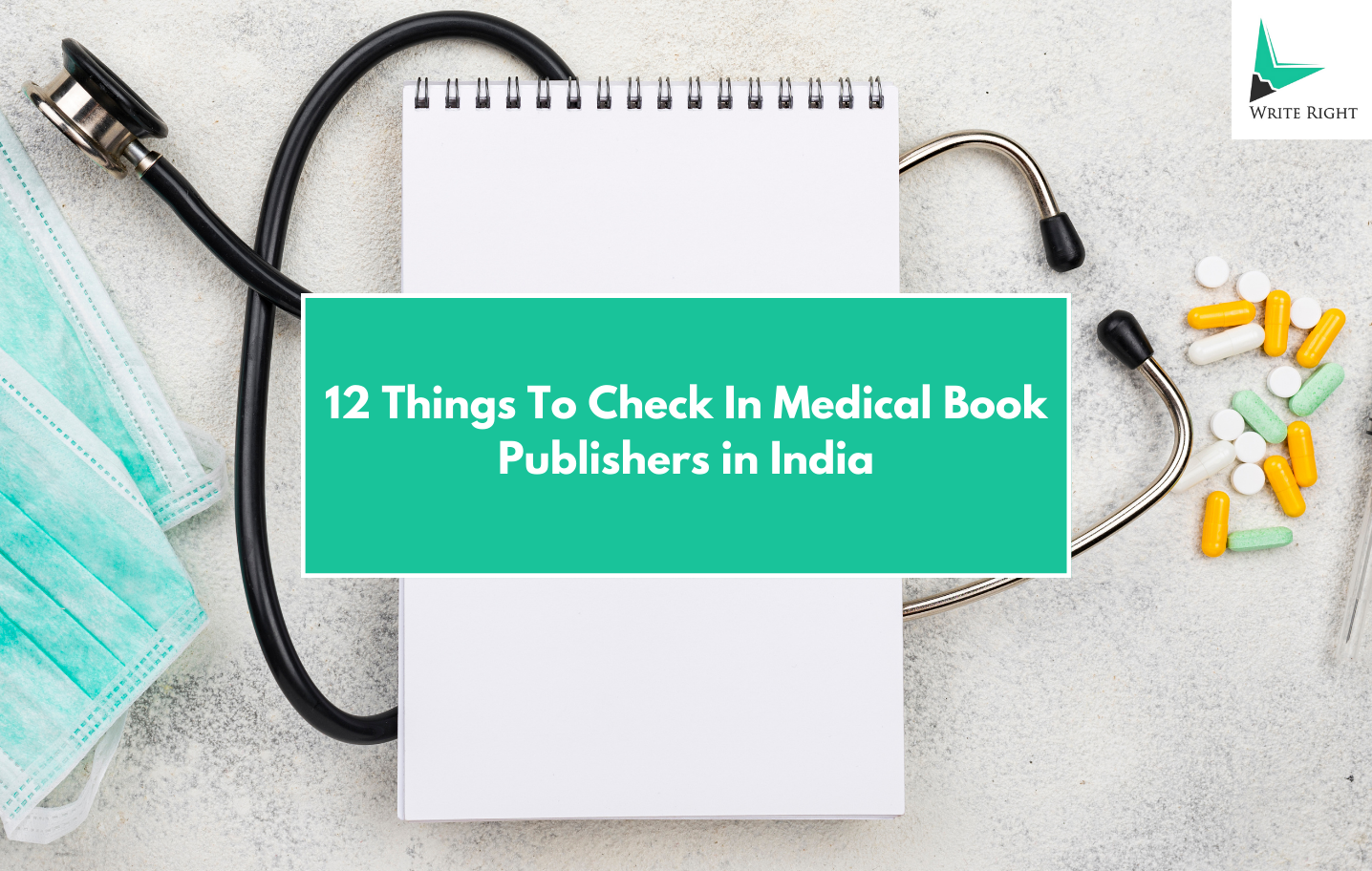Medical book publishing in India is highly specialized, requiring a balance of scientific accuracy, peer review, and institutional reach. Authors and academics must navigate challenges such as copyright clearance for figures and tables, color printing costs, indexing standards, and distribution into medical colleges and libraries. First-time authors often struggle to identify credible publishers while avoiding vanity presses.
“At Write Right, we’ve supported over 100 medical and academic authors in publishing peer-reviewed works, reference manuals, and educational textbooks, ensuring compliance, accuracy, and distribution into institutional networks.”
This guide highlights 12 essential checks every doctor, researcher, and academic must consider before signing a publishing deal. By following these steps, you can ensure your medical book meets global academic standards, is widely accessible in India and abroad, and protects your intellectual property.
Why Choose a Trusted Guide for Medical Book Publishing in India
Publishing medical books in India is highly specialized. From peer-reviewed accuracy to institutional distribution, the stakes are high: errors can compromise credibility, while poor distribution can limit readership.
At Write Right, our expertise spans peer review facilitation, manuscript editing, illustration sourcing, copyright clearance, and global distribution. By partnering with us, authors can avoid vanity publishers, reduce production costs, and ensure their work meets international academic standards.
Publish Your Medical Research
Write Right helps medical authors create authoritative textbooks, reference guides, and research publications with professional editing and formatting.
1. Check if Peer Review is Offered
Peer review is the backbone of credible medical book publishing. Many so-called medical publishers skip this crucial step, which can undermine your book’s scientific accuracy and adoption by universities, hospitals, and medical libraries.
Why it matters: Peer-reviewed books are far more likely to be cited in academic research, accepted in medical courses, and trusted by professionals. Lack of peer review can damage your credibility and limit institutional adoption.
Dr. R.K. Sharma, senior professor at AIIMS, notes, “A peer-reviewed book is ten times more likely to be adopted by universities and hospitals.”
Tip: Confirm whether the publisher conducts a double-blind peer review, involves subject-matter experts, and provides feedback for revisions before acceptance. Write Right ensures that authors are paired with publishers maintaining robust peer-review protocols, reducing risks of errors and delays.
2. Verify Accuracy Standards for Clinical Content
Accuracy is non-negotiable in medical book publishing in India. Each claim must be backed by reliable references from reputable journals, textbooks, or research papers. Inaccurate content can expose authors to liability and tarnish their professional reputation.
Why it matters: Hospitals, colleges, and professional associations rely on precise, evidence-backed content. A single unverified claim can lead to retractions, recalls, or legal consequences.
Tip: Always ask publishers about their verification workflow, editorial checks, and fact-checking policies. At Write Right, we assist authors by cross-checking references, validating clinical claims, and providing compliance checklists to meet institutional and regulatory standards.
Case study: A pharmacology book was recalled because the publisher failed to verify drug references, highlighting the importance of strict accuracy standards.
3. Clarify Copyright Rules for Figures and Tables
Medical books frequently include diagrams, tables, clinical images, X-rays, and diagnostic charts. Many of these require third-party permissions. Publishing without proper copyright clearance can lead to lawsuits, takedowns, or restricted distribution.
Why it matters: Authors are legally responsible for any copyrighted material included in their books. Publishers may assume the author has cleared permissions, leaving the liability entirely on the creator.
Legal advisor insight: “Always check if image rights are cleared. Many publishers assume authors handle permissions. This is especially critical in medical books with complex illustrations and patient data.”
Tip: Maintain a detailed checklist of all figures, tables, and diagrams with source and copyright status. Write Right guides authors in obtaining proper licenses and managing figure/table attributions, ensuring full legal compliance before submission.
From Clinical Notes to Published Texts
We guide medical professionals in turning complex research and case studies into well-structured, published books ready for students and practitioners.
4. Ask About Indexing & Referencing Support
Referencing and indexing are crucial in academic and medical publishing. Citation styles like Vancouver, APA, or Harvard differ by publisher. Inconsistent referencing can delay publication and affect the book’s credibility in academic and institutional settings.
Why it matters: Libraries, universities, and medical colleges often reject textbooks that lack proper indexing or standardized references. Proper citation ensures that your work is respected, citable, and discoverable in academic databases.
Author testimonial: “My publisher’s weak referencing delayed my release by six months — Write Right’s editorial support prevented such delays for other authors.”
Tip: Confirm whether the publisher handles indexing in-house or outsources it. Write Right provides detailed editorial support for referencing, ensuring that medical books meet institutional standards and indexing requirements.
- Evaluate Contracts Closely for Rights Retention
Before signing with a medical book publisher in India, scrutinize contract clauses related to copyright, translation, adaptation, and derivative rights. Some publishers include “world rights” clauses that transfer significant control without compensation.
Why it matters: Losing control over translation or derivative works can prevent you from publishing future editions, digital versions, or international editions. Clear contract terms protect your intellectual property and long-term publishing potential.
Lawyer commentary: “Academic publishing contracts often have ‘rights grab’ clauses that negotiate early to retain control over translations and derivative works.”
Tip: Use Write Right to review contracts for hidden clauses, rights retention, and potential royalties. Our experts ensure authors maintain ownership while still collaborating effectively with reputable medical publishers.
6. Check Cost Transparency in Color Printing
Medical books often include color plates for diagrams, scans, imaging, and detailed charts. Cost transparency is critical because vanity presses or less reputable publishers may inflate printing costs, particularly for color-intensive publications.
Why it matters: Excessive printing costs can make your book financially unviable, limit institutional adoption, and reduce royalty margins.
Tip: Always request a detailed cost breakdown for illustrations, diagrams, and bulk orders. Write Right helps authors evaluate multiple printing vendors to optimize production costs without compromising quality.
Case study: One author was charged ₹4 lakhs for color plates at a vanity press, whereas Write Right-guided publishing reduced the cost to ₹1.2 lakhs by negotiating bulk print rates and sourcing cost-efficient printers.
[Explore Complete Author Journey]
7. Understand Distribution Into Libraries and Institutions
In medical book publishing in India, institutional sales are often more valuable than retail or online sales. Hospitals, medical colleges, and exam boards are primary buyers.
Why it matters: Without institutional distribution, your book may never reach the target audience of medical students, professionals, or researchers.
Tip: Request a list of institutional tie-ups, bulk order policies, and catalog inclusion procedures. Write Right provides authors with verified distribution insights to maximize institutional reach.
Case study: A medical reference book reached 30+ medical colleges in India within three months through Write Right’s strategic distribution plan, including library catalogs and bulk academic orders.
8. Ask About Global Distribution for Academic Readers
Many medical authors aim for international availability to reach NRI doctors, global students, and research professionals. Publishers using networks like Ingram, Springer, or international academic distributors can significantly expand reach.
Why it matters: Without proper global distribution, your work may remain inaccessible to overseas institutions, limiting citations and academic credibility.
NRI doctor testimonial: “My book was accessible in the UK within 60 days through Ingram distribution, facilitated by Write Right.”
Tip: Confirm availability on Amazon US/UK, academic marketplaces, and international library networks. Write Right ensures international distribution channels are activated early to maximize visibility.
Make Your Medical Book Accessible
Write Right ensures your medical publications meet academic standards, with precise formatting, peer-reviewed editing, and print-ready layouts.
9. Verify Editorial Expertise in Medicine
A qualified editor with a medical or scientific background ensures factual accuracy, readability, and compliance with academic standards. Poor editorial oversight can damage credibility and reduce adoption by institutions.
Why it matters: Errors in clinical content, misinterpretation of research, or inconsistent terminology can undermine trust in your work.
Senior editor insight: “Editors familiar with clinical practice help prevent factual errors and maintain readability for both students and professionals.”
Tip: Ask for the editor’s profile, prior publications, and medical expertise. Write Right matches authors with experienced editors who specialize in medical and academic texts.
10. Clarify Royalty and Pricing Models
Academic and medical books often have lower royalty percentages compared to trade books, but institutional pricing is higher. Authors must clearly understand net receipts, print runs, and sales channels.
Why it matters: Misunderstanding royalties can lead to financial surprises, especially with returns, discounts, and institutional bulk pricing.
Accountant insight: “Institutional pricing is higher, but royalty calculations vary. Clarify if royalties are net of taxes, discounts, and returns.”
Tip: Negotiate upfront for clarity on royalties, advances, and resale pricing. Write Right ensures authors have transparent financial agreements and understand all revenue streams.
11. Ask About Post-Publication Support
Medical content evolves rapidly. Publishers must support corrections, errata, and second editions to keep content accurate and relevant.
Why it matters: Outdated or erroneous information can compromise your book’s credibility and safety, particularly in fields like pharmacology, surgery, or diagnostics.
Author testimonial: “My pharmacology textbook was updated every two years with new editions. Write Right ensured smooth updates and minimal errors.”
Tip: Verify the publisher’s workflow for updates, errata, and new editions. Write Right facilitates timely revisions and ensures that your work remains current and authoritative.
12. Check Reputation Through Author Reviews
Many vanity presses pose as reputable medical book publishers in India. Reviews from verified authors provide the most reliable insight into publisher credibility.
Why it matters: Marketing claims are often misleading; past author experiences reveal transparency, distribution success, and editorial quality.
Testimonial from a doctor-author: “Write Right’s guidance helped me avoid a vanity press that promised distribution but delivered nothing.”
Tip: Request references, verify author networks, and check peer reviews. Write Right offers due diligence support, connecting authors only with publishers who meet rigorous credibility standards.
Publish Cutting-Edge Medical Knowledge
Estorytellers helps doctors and researchers transform their findings into high-quality, peer-ready medical books for students and professionals.
Why Experienced Guidance Makes All the Difference
A medical book’s success depends on more than just content. It requires trustworthy publishing partners, efficient distribution, and professional editorial oversight. Many publishers offer glossy promises but fail to deliver on peer review, cost transparency, or institutional reach.
Write Right addresses these gaps:
- Peer-reviewed manuscripts for academic and clinical credibility.
- Cost-effective printing and illustration management.
- Institutional and global distribution, including medical libraries and international markets.
- Post-publication support, ensuring updates and second editions are handled seamlessly.
“With Write Right’s support, my textbook was adopted in 30+ colleges and reached international academic readers within months,” notes an academic author.
Leverage Write Right’s expertise to ensure your medical book achieves credibility, compliance, and widespread adoption.
Conclusion
Publishing a medical book is about credibility, compliance, and distribution, not just printing. From peer review and editorial expertise to color printing, royalties, and institutional adoption, every detail matters. By following the 12 essential checks outlined in this guide, you can avoid costly mistakes, maintain professional integrity, and ensure your work reaches its target audience, including universities, hospitals, and international readers.
Partnering with experienced publishing services like Write Right can simplify this process. We support authors with manuscript preparation, peer review facilitation, rights management, printing guidance, and distribution networks.
With the right publisher and professional guidance, your medical book can achieve maximum reach, credibility, and impact in India and globally.
Related Reads:
How to Achieve Successful Book Publishing in India: Ways, Costs And Publishers For 2025
FAQs
Top publishers include Jaypee Brothers Medical Publishers, Estorytellers, Wolters Kluwer India, Elsevier India, and CBS Publishers. Write Right also recommends niche academic presses that specialize in peer-reviewed medical and research texts. First-time authors can leverage Write Right’s guidance to identify the best-fit publisher based on field, book type, and institutional reach.
Do medical publishers in India offer peer review?
Credible medical publishers conduct peer review through domain experts. Peer review ensures accuracy, credibility, and adoption in libraries and institutions. Write Right helps authors identify publishers who maintain strict scientific standards, reducing the risk of factual errors and enhancing professional acceptance.
How much does it cost to publish a medical book in India?
Costs range from ₹60,000 to ₹3,00,000 depending on printing, color plates, illustrations, and first-run volumes. Write Right assists authors in budgeting realistically while choosing cost-effective, high-quality production options.
Do I need to get copyright clearance for images and charts?
Yes. Medical images, diagnostic diagrams, and charts often require permission from original sources. Write Right guides authors through the copyright process, ensuring compliance with legal requirements and avoiding potential infringement disputes.
How are royalties structured in medical publishing?
Royalties are often 5–12% of net receipts, with higher institutional pricing but smaller percentage returns. Write Right ensures authors understand calculation methods, advance payments, and distribution-based royalties.
Can Indian medical publishers distribute books internationally?
Some publishers use global distributors like Ingram to make books available in the US, UK, and other academic markets. Write Right helps authors access these networks to maximize international reach and adoption.
How do medical publishers handle updates and second editions?
Revisions, errata, and second editions are critical in medicine. Reputable publishers maintain structured update cycles, often every 2–3 years. Write Right coordinates updates and ensures seamless incorporation of new research for accuracy and compliance.




